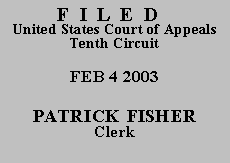

| LARRY R. EDWARDS,
v.
JOHN F. POTTER, Postmaster
General, United States Postal Service |
|
On August 20, 2001, Mr. Edwards filed a complaint against the Postmaster General of the United States ("Defendant") alleging that he was wrongfully terminated from his position with the United States Postal Service on account of his race, sex, and age. On February 5, 2002, well beyond the 120-day time limit for service of process set forth in Fed. R. Civ. P. 4(m), Defendant appeared specially and moved to dismiss for failure to serve the appropriate entities in accordance with Fed. R. Civ. P. 4(i). Noting that Mr. Edwards had served neither the Attorney General of the United States nor the United States Attorney for the Northern District of Oklahoma, the district court denied the motion to dismiss and granted Mr. Edwards a 15-day extension within which to comply with Rule 4(i). Following the expiration of the 15-day period, Defendant once again appeared specially to request dismissal of Mr. Edward's action. Instead of granting Defendant's motion, the district court again granted Mr. Edwards an additional 15-day extension, noting that although he had filed a return of service as to the United States Attorney for the Northern District of Oklahoma, the docket sheet still showed no return of service as to the Attorney General of the United States. On May 14, 2002, over one month after the previous 15-day extension was granted, the district court found that Mr. Edwards did not properly serve Defendant within the additional time granted and dismissed the action without prejudice pursuant to Rule 4(m).
In his brief to this court, Mr. Edwards contends that he should be granted a "continuation" because he has shown the court that he is "trying to go by the rules." Aplt. Br. at 3.(1) In his reply brief, Mr. Edwards also argues that he in fact properly served each of the entities required under Rule 4(i). Defendant contends that none of the required entities were served with a copy of the complaint.
We review a district court's dismissal for untimely or improper service of process for abuse of discretion. See Jones v. Frank, 973 F.2d 872, 872 (10th Cir. 1992). To effect service of process on an agency of the United States or an officer of the United States acting in an official capacity, the plaintiff must deliver a copy of the summons and complaint to the United States Attorney for the district in which the suit is brought and send a copy of the summons and the complaint by registered or certified mail to both the Attorney General of the United States and the applicable officer or agency. Fed. R. Civ. P. 4(i)(2)(A). Under Rule 4(m), if proper service of the summons and complaint is not made within 120 days after the filing of the complaint, the district court must nonetheless grant an "appropriate" extension of time upon a showing by the plaintiff of "good cause for the failure." Fed. R. Civ. P. 4(m); see also Espinoza v. United States, 52 F.3d 838, 840-841 (10th Cir. 1995). If the plaintiff fails to show good cause, the district court retains discretion either to: (1) dismiss the action without prejudice, or (2) direct that service be effected within a specified time. Id. Rule 4(i)(3) further provides that where there is a failure to serve a required party in an action governed by Rule 4(i)(2)(A), and the plaintiff has at least served either the United States attorney or the Attorney General of the United States, "[t]he court shall allow a reasonable time to serve process under Rule 4(i) for the purpose of curing the failure to serve."
After carefully reviewing the parties' briefs, the district court's orders, and the entire record on appeal, we agree with the district court that Mr. Edwards failed to comply with the rules for serving an official or agency of the United States within the applicable time period. Moreover, the district court twice identified the relevant deficiencies and extended the time within which Mr. Edwards could correct them. Under such circumstances, we cannot say that the district court abused its discretion in dismissing Mr. Edward's complaint.
AFFIRMED.
Entered for the Court
Paul J. Kelly, Jr.
Circuit Judge
*. This order and judgment is not binding precedent, except under the doctrines of law of the case, res judicata, and collateral estoppel. This court generally disfavors the citation of orders and judgments; nevertheless, an order and judgment may be cited under the terms and conditions of 10th Cir. R. 36.3.
2. After examining the briefs and the appellate record, this three-judge panel has determined unanimously that oral argument would not be of material assistance in the determination of this appeal. See Fed. R. App. P. 34(a); 10th Cir. R. 34.1(G). The case is therefore ordered submitted without oral argument.
1. In his brief, Mr. Edwards also renews his request for appointment of counsel. In response to his initial request for counsel, the magistrate judge to whom the matter was referred denied the request on the ground that Mr. Edwards failed to provide any information to the court that would enable it to conclude whether counsel should be appointed under the factors outlined Long v. Shillinger, 927 F.2d 525, 527 (10th Cir. 1991). In so doing, the magistrate judge stated that the denial was "without prejudice to being reasserted with relevant information demonstrating the necessity of appointment of counsel." I. Rec. Doc. 17 at 2. We deny the request for appointment of counsel.